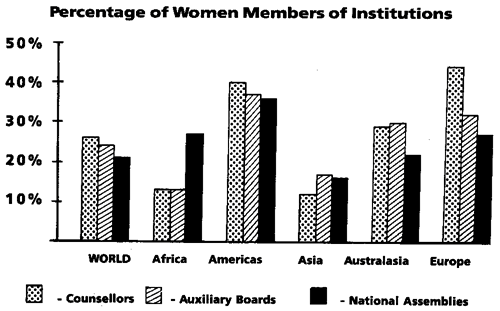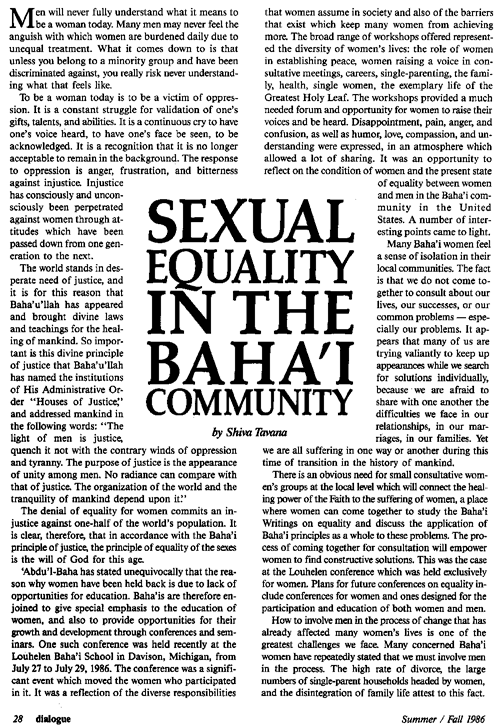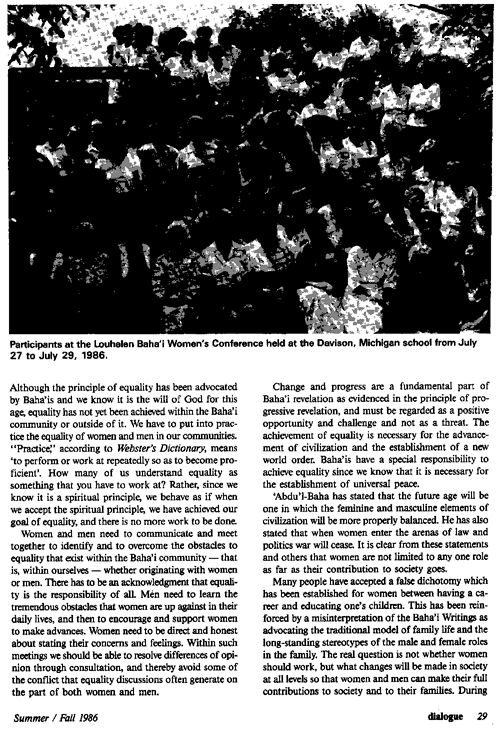
|
|
Abstract: Women are oppressed minorities who often feel isolated, even in Bahá'í communities. Bahá'ís need to explore new models of family life. Includes statistics on the percentages of female members of Bahá'í institutions. Notes: |
Sexual Equality in the Bahá'í Community
by Shiva Tavana
published in dialogue, 1:3, pages 28-31Los Angeles: 1986
To be a woman today is to be a victim of oppression. It is a constant struggle for validation of one’s gifts, talents, and abilities. It is a continuous cry to have one’s voice heard, to have one’s face be seen, to be acknowledged. It is a recognition that it is no longer acceptable to remain in the background. The response to oppression is anger, frustration, and bitterness against injustice. Injustice has consciously and unconsciously been perpetrated against women through attitudes which have been passed down one generation to the next.
The world stands in desperate need of justice, and it is for this reason that Bahá'u'lláh has appeared and brought divine laws and teachings for the healing of mankind. So important is this divine principle of justice that Bahá'u'lláh has named the institutions of His Administrative Order “Houses of Justice,” and addressed mankind in the following words: “The light of men is justice, quench it not with the contrary winds of oppression and tyranny. The purpose of justice is the appearance of unity among men. No radiance can compare with that of justice. The organization of the world and the tranquility of mankind depend upon it.”
The denial of equality for women commits an injustice against one-half of the world’s population. It is clear, therefore, that in accordance with the Bahá'í principle of justice, the principle of equality of the sexes is the will of God for this age.
‘Abdu’l-Bahá has stated unequivocally that the reason why women have been held back is due to lack of opportunities for education. Bahá'ís are therefore enjoined to give special emphasis to the education of women, and also to provide opportunities for their growth and development through conferences and seminars. One such conference was held recently at the Louhelen Bahá'í School in Davison, Michigan, from July 27 to July 29, 1986. The conference was a significant event which moved the women who participated in it. It was a reflection of the diverse responsibilities that women assume in society and also of the barriers that exist which keep many women from achieving more. The broad range of workshops offered represented the diversity of women’s lives: the role of women in establishing peace, women raising a voice in consultative meetings, careers, single-parenting, the family, health, single women, the exemplary life of the Greatest Holy Leaf. The workshops provided a much needed forum and opportunity for women to raise their voices and be heard. Disappointment, pain, anger, and confusion, as well as humor, love, compassion, and understanding were expressed, in an atmosphere which allowed a lot of sharing. It was an opportunity to reflect on the condition of women and the present state of equality between women and men in the Bahá'í community in the United States. A number of interesting points came to light.
Many Bahá'í women feel a sense of isolation in their local communities. The fact is that we do not come together to consult about our lives, our successes, or our common problems—especially our problems. It appears that many of us are trying valiantly to keep up appearances while we search for solutions individually, because we are afraid to share with one another the difficulties we face in our relationships, in our marriages, in our families. Yet we are all suffering in one way or another during this time of transition in the history of mankind.
There is an obvious need for small consultative women’s groups at the local level which will connect the healing power of the Faith to the suffering of women, a place where women can come together to study the Bahá'í Writings on equality and discuss the application of Bahá'í principles as a whole to these problems. The process of coming together for consultation will empower women to find constructive solutions. This was the case at the Louhelen conference which was held exclusively for women. Plans for future conferences on equality include conferences for women and ones designed for the participation and education of both women and men.
How to involve men in the process of change that has already affected many women’s lives is one of the greatest challenges we face. Many concerned Bahá'í women have repeatedly stated that we must involve men in the process. The high rate of divorce, the large numbers of single-parent households headed by women, and the disintegration of family life attest to this fact. Although the principle of equality has been advocated by Bahá'ís and we know it is the will of God for this age, equality has not yet been achieved within the Bahá'í community or outside of it. We have to put into practice the equality of women and men in our communities. “Practice,” according to Webster’s Dictionary, means ‘to perform or work at repeatedly so as to become proficient’. How many of us understand equality as something that you have to work at? Rather, since we know it is a spiritual principle, we behave as if when we accept the spiritual principle, we have achieved our goal of equality, and there is no more work to be done.
Women and men need to communicate and meet together to identify and to overcome the obstacles to equality that exist within the Bahá'í community—that is, within ourselves—whether originating with women or men. There has to be an acknowledgment that equality is the responsibility of all. Men need to learn the tremendous obstacles that women are up against in their daily lives, and then to encourage and support women to make advances. Women need to be direct and honest about stating their concerns and feelings. Within such meetings we should be able to resolve differences of opinion through consultation, and thereby avoid some of the conflict that equality discussions often generate on the part of both women and men.
Change and progress are a fundamental part of Bahá'í revelation as evidence in the principle of progressive revelation, and must be regarded as a positive opportunity and challenge and not as a threat. The achievement of equality is necessary for the advancement of civilization and the establishment of a new world order. Bahá'ís have a special responsibility to achieve equality since we know that it is necessary for the establishment of universal peace.
‘Abdu’l-Bahá has stated that the future age will be one in which the feminine and masculine elements of civilization will be more properly balanced. He has also stated that when women enter the arenas of law and politics war will cease. It is clear from these statements and others that women are not limited to any one role as far as their contribution to society goes.
Many people have accepted a false dichotomy which has been established for women between having a career and educating one’s children. This has been reinforced by a misinterpretation of the Bahá'í Writings as advocating the traditional model of family life and the long-standing stereotypes of the male and female roles in the family. The real question is not whether women should work, but what changes will be made in society at all levels so that women and men can make their full contributions to society and to their families. During the conference, for example, one woman commented that women do not want to become victims of the same work system that men have been subjected to for years. For this reason many women are choosing to leave corporate life to start their own businesses or to serve as consultants for the greater flexibility it affords them.
Fewer than 10 percent of American families fit the traditional model of a married couple with children in which the husband is the sole provider. Both parents in most married-couple families work, and the number of single-parent households headed by women has increased rapidly with the growing frequency of divorce and unwed mothers. However, social institutions in the United States are still organized in ways that assume that the “traditional family” is the dominant family type. These institutions have not recognized current realities or responded to them with supportive work and family policies such as child care and maternity and parental leave and benefits.
In light of these facts it is particularly important for Bahá'ís to be open to new ideas and willing to explore and experiment with new models of family life and alternative lifestyles which give both women and men greater options and flexibility. For example, there is an imperative necessity to integrate fathers into the process of educating and nurturing their children, not only for the benefits which will accrue to them for doing so but also for children to have positive male and female role models and nonsexist training within the home. Another aspect of family life today is the problems facing single parents. Single-parent women at the Louhelen conference drew up a proposal for the establishment of a national task force which would address itself to their social concerns.
Bahá'u'lláh has not only brought the principle of the equality of women and men as the will of God for this age, but he has also ensured that women will have equal opportunity and responsibility in establishing a new world order, through their right of election to and service on the administrative institutions of the Faith—the Houses of Justice. In a worldwide survey of national Bahá'í communities conducted by the Bahá'í International Community for Women, the single factor most frequently cited as promoting the advancement of women was their election to and service on local and national assemblies. The implications of this prerogative for women to serve on decision-making bodies are far-reaching, and we can now only have a glimpse of its ramification for women’s development. This right, together with the obligation for women to participate fully and equally in the process of consultation, will reap extraordinary results over time. The results of a worldwide United Nations survey, entitled, “The State of the World’s Women 1985,” compiled the results of a questionnaire completed by 121 governments reviewing the status of women in their countries (“The State of the World’s Women,” p. 3) Bahá'í institutions and communities will have to stand in sharp contrast to these results when comparisons are made, and they will be made soon. The Universal House of Justice has offered that Bahá'í experience as a model for study, to reinforce hope in the unity of the human race. Let us demonstrate in a convincing way that the experience is one in which we are ‘practicing,’ working at, establishing the equality of women and men.
Information provided by the Department of Statistics at the Bahá'í World Center.
PARTICIPATION OF WOMEN IN BAHÁ’Í INSTITUTIONS
“The equality of men and women is not, at the present time, universally applied. In those areas where traditional inequality still hampers its progress we must take the lead in practicing this Bahá'í principle. Bahá'í women and girls must be encouraged to take part in the social, spiritual and administrative activities of their communities.” (The Universal House of Justice, Riḍván 1984.)
| 1953 | 1963 | 1973 | 1979 | 1985 | |
| Africa | 0 | 4 | 58 | 53 | 103 |
| Americas | 18 | 82 | 86 | 106 | 131 |
| Asia | 0 | 11 | 35 | 33 | 39 |
| Australasia | 5 | 8 | 26 | 24 | 33 |
| Europe | 11 | 44 | 40 | 44 | 48 |
| World | 34 | 149 | 245 | 260 | 354 |
The following table shows, by continent, the numbers of National Spiritual Assemblies with their corresponding numbers of women members indicated by the column headings. (e.g. column 1, line 1, there are 4 Assemblies in Africa with no women members):
| 0 | 1 | 2 | 3 | 4 | 5 | 6 | 7 | 8 | 9 | |
| Africa | 4 | 9 | 13 | 6 | 6 | 4 | 1 | 0 | 0 | 0 |
| Americas | 1 | 4 | 8 | 10 | 12 | 4 | 1 | 1 | 0 | 0 |
| Asia | 5 | 14 | 3 | 3 | 0 | 2 | 0 | 0 | 0 | 0 |
| Australasia | 2 | 6 | 4 | 2 | 2 | 1 | 0 | 0 | 0 | 0 |
| Europe | 1 | 4 | 6 | 7 | 1 | 0 | 0 | 1 | 0 | 0 |
| World | 13 | 37 | 34 | 28 | 21 | 11 | 2 | 2 | 0 | 0 |

Shiva Tavana has worked over the past few years on United Nations economic and social issues regarding the advancement of women, human rights, and youth. She has a particular interest in the role of women in establishing world peace. She attended the Final United Nations Conference to Review and Appraise the Achievements of the UN Decade for Women, held in Nairobi, Kenya, last July.
Response by Dann Irish, in dialogue 2:1, p. 4
Bahá'ís in Recovery
Shiva Tavana’s article, “Sexual Equality in the Bahá'í Community” (Summer/Fall 1986) prompts me to share a new development that offers a practical means “…to connect the healing power of the Faith” with a common suffering: substance addiction/disease. It is called Bahá'í in Recovery.
In recent years, Bahá'ís suffering from chronic substance addiction, myself included, felt as Ms. Tavana so clearly states, “a sense of isolation in their local communities…that we do not come together to consult about our successes, or our problems—especially our problems.”
I have noticed in the Bahá'í community believers dying from addiction to alcohol while the community seemed powerless to do anything about it. It wasn’t until after meeting an isolated believer living in a small Indian village that I received a message of hope for my own recovery. This Elder of the Haida people was a Bahá'í and a member of Alcoholics Anonymous. He shared with me in complete honesty and confidence his story of recovery—his experience, strength, and hope. This encounter 15 years ago in a small one bedroom cabin in Southeast Alaska had a profound affect on my life. Clarence has since passed on with many years of serene sobriety under his belt. We claim him, as well as the Bahá'ís who did not make it to their graves sober but who performed great services to the Faith, as godparents of the BIRP movement.
It is important to state the obvious: Just becoming a Bahá'í won’t make the problem disappear. As in the life of a diabetic, becoming a Bahá'í will never be a substitute for insulin. It is not a moral issue for the Bahá'í who comes into the Faith with the disease already contracted. It is not his or her fault for having the disease and it is nothing to be ashamed of. It is the responsibility of the individual and society to do something about it.
Even after becoming a Bahá'í I had many relapses and was diagnosed by a professional as being a hopeless case. But it is not my intent to tell my story. I am only one miracle among a million who have recovered; and one Bahá'í among many who are beginning to connect with each other in the Bahá'ís in Recovery Program fellowship.
So far, most of us are also members of AA and other 12 Step fellowships and are thus familiar with the dynamic and spiritual potential with God-centered self-help groups. Our aim is merely to assist and serve this release of potential in the Bahá'í community. We have begun BIRP as a means not only to share and care with each other, but reach out to others still active in their addiction. We also are available to assist educating our Bahá'í family where there is a problem with substance abuse in our families, schools, relationships, and work. And we can help build bridges to help find the right kind of support outside of the Faith, such as the 12 Step groups mentioned above.
To quote Ms. Tavana again, “we are all suffering in one way or another during this transition in the history of mankind,” and there is no reason why any Bahá'í need feel isolated with their problems in the Faith—no matter what the issue is. No matter how serious or overwhelming a problem may seem, there are others who are surviving with gratefulness to God and who are also finding understanding in fellowship with others facing common problems together. And never has the need been greater.
We offer to any who can use it our BIRP format, and a suggestion that anyone interested attend an open AA or ALANON meeting to see how simple and moving a self-help group can be.
- Dann Irish
Petersburgh, Alaska
 click for larger image |
 click for larger image |
 click for larger image |
 click for larger image |
Response by Dann Irish, published in dialogue 2:1 p. 4 (1987) |
 click for larger image |
|
|